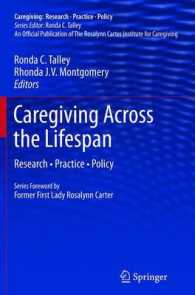基本説明
This book offers a microanalysis of an online supoprt group on eating disorders, specifically the communication through textual messages between newcomers and regular members and members' nicknames. The study uses an ethnomethodological and conversation analytical approach to show that members of online support groups treat the group as a community in which their illness-identity is highly relevant.
Full Description
Online support groups are considered highly valuable in addition to traditional health care services, but we know very little about how people actually join such a group. This book offers a microanalysis of an online support group on eating disorders, specifically the communication through textual messages between newcomers and regular members and members' nicknames. The study uses an ethnomethodological and conversation analytical approach to show that members of online support groups treat the group as a community in which their illness-identity is highly relevant. It appears that members invoke community norms regarding legitimacy for newcomers: Newcomers are expected to admit that they are ill, but this is a very difficult step for those who have not yet fully adopted the "sick role" (Parsons, 1951). In the field of eating disorders, it is particularly difficult for people that tend to pro-ana, i.e. the glamorization of eating disorders. The insecurity and anxiety that newcomers display as they enter the online group could probably be relieved when a special entry subforum would be installed in which they can take time and space to actually recognize that they are ill.
Contents
Acknowledgements
Introduction
Part I: An ethnomethodological approach to community, identity and eating disorders
Chapter 1: The online support group as a community
Chapter 2: Identity in a community
Chapter 3: Accomplishing identity in an online community on eating disorders
Part II: Discourse analysis
Chapter 4: Research design: The forum, ethics, data and method
Chapter 5: Identity accomplished through nicknames
Chapter 6: Opening the first posting: Ambivalence towards the community
Chapter 7: Displaying forumability in the online community
Chapter 8: The main requirement of forumability: Recognition
Part III: Interpretation and conclusion
Chapter 9: Entering the online support group and adopting the sick role
Chapter 10: Conclusions and discussion
Part IV: References and appendix
References
Appendix








